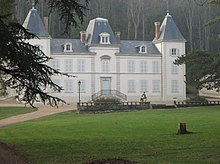Mandel Szkolnikoff
You can help expand this article with text translated from the corresponding article in French. (May 2020) Click [show] for important translation instructions.
|
Mandel Szkolnikoff | |
|---|---|
| Born | 28 January 1895 |
| Died | 10 June 1945 (aged 50) |
| Cause of death | Assassinated by French intelligence |
| Occupation | Businessman |
Mandel Szkolnikoff (28 January 1895 – 10 June 1945), better known as Michel Szkolnikoff, was a Belarusian-French businessman, billionaire, and Nazi collaborator. During the German occupation of France, he made a fortune by supplying the Kriegsmarine and the Schutzstaffel, mainly with textiles. After the war, Szkolnikoff fled to Francoist Spain, but was killed during an attempted abduction by French intelligence.
Early life
[edit]Mandel Szkolnikoff was born on 28 January 1895 in Sharkawshchyna in the Russian Empire, now in Belarus. He was Jewish.[1] He had a German passport.[1]
Career
[edit]
Szkolnikoff was a major economic collaborator in the occupied France during the Second World War. Less known than Joseph Joanovici, he made a considerable fortune by supplying the Kriegsmarine and then the SS, mainly in textiles, and was described as "the man who pushed the practice of black market to an extreme."[2]
He reinvested his returns to build a real estate empire.[3]
Death
[edit]Szkolnikkoff died in unclear circumstances on 10 June 1945 near Madrid in Spain.[1] The most generally accepted theory now is that he was unintentionally killed during an attempted kidnapping in Spain by French intelligence. In 1944, the Direction générale des études et recherches, the secret service agency of the Provisional Government of the French Republic, created a group to abduct or kill French collaborators who'd hidden in Francoist Spain. Members of this group set up a plan to capture Szkolnikoff and exfiltrate him to France. Under the pretext of reselling jewelry, he was lured to Madrid to be abduct and repatriated to France. However, Szkolnikoff fought back, after which he was knocked out, drugged, and put in a car truck headed towards the French border. While the road, however, the agents noticed that Szkolnikoff had died. They disposed of the body in a field under the bridge, after dousing it with gasoline and setting it on fire.[4] The partly charred body was later found by a peasant.[5]
References
[edit]- ^ a b c Le mystère Szkolnikoff, Le Parisien, February 2, 2014
- ^ Renaud de Rochebrune, Jean-Claude Hazera, Les Patrons sous l'Occupation, Paris: Editions Odile Jacob, 2013, pp. 229-235
- ^ Fabrice Grenard, La France du marché noir (1940-1949), Paris: Editions Payol, 2012, p. 180
- ^ Renaud de Rochebrune; Jean-Claude Hazera (2013). Les Patrons sous l'Occupation. Paris: Odile Jacob. p. 229 à 235. ISBN 978-2-7381-2938-3.
- ^ Pierre Abramovici, Szkolnikoff, le plus grand trafiquant de l'Occupation, p. 186
- 1895 births
- 1945 deaths
- People from Sharkawshchyna District
- Belarusian Jews
- Assassinated Jews
- Assassinated Nazis
- Accidental deaths in Spain
- Belarusian expatriates in Spain
- French expatriates in Spain
- Executed French collaborators with Nazi Germany
- Executed Belarusian collaborators with Nazi Germany
- Executed Jewish collaborators with Nazi Germany
- Jews from the Russian Empire
- French billionaires
- Emigrants from the Russian Empire to Spain
- People killed in French intelligence operations
- Nazis who fled to Spain
- French business biography stubs
